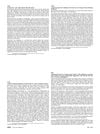 1 citations,
August 2021 in “Movement disorders clinical practice”
1 citations,
August 2021 in “Movement disorders clinical practice” A man with Isaac's syndrome affecting only one side of his body improved after immune system-targeted treatment.
 1 citations,
April 2021 in “Nepal journal of dermatology, venereology & leprology”
1 citations,
April 2021 in “Nepal journal of dermatology, venereology & leprology” Skin diseases are changing, with more allergic and immune-related conditions, but infections remain a major concern.
 1 citations,
April 2018 in “Journal of Investigative Dermatology”
1 citations,
April 2018 in “Journal of Investigative Dermatology” Tofacitinib helped most patients with alopecia areata regrow hair and changes in immune cells were linked to the treatment's effectiveness.
 1 citations,
February 2018 in “Orthopedics and rheumatology”
1 citations,
February 2018 in “Orthopedics and rheumatology” Combining Western chemotherapy with Traditional Chinese Medicine can reduce side effects and improve immune response in treating bone and soft tissue tumors.
 1 citations,
July 2014 in “Our Dermatology Online”
1 citations,
July 2014 in “Our Dermatology Online” The patient with both scarring and non-scarring hair loss showed complex immune reactions and improved with steroid treatment.
 March 2024 in “Advanced science”
March 2024 in “Advanced science” A new hydrogel made from human cells improves wound healing by working with immune cells to promote repair.
 February 2024 in “bioRxiv (Cold Spring Harbor Laboratory)”
February 2024 in “bioRxiv (Cold Spring Harbor Laboratory)” Activating TLR9 helps heal large wounds and regrow hair by involving a specific type of immune cell.

Dupilumab helped improve skin and prevent new lesions in a child with a rare immune disorder and severe eczema.
 July 2023 in “Journal of allergy and clinical Immunology. Global”
July 2023 in “Journal of allergy and clinical Immunology. Global” A 10-month-old boy with a rare combination of genetic conditions has severe immune deficiency and treatment challenges.
 February 2023 in “Vlaams dierengeneeskundig tijdschrift”
February 2023 in “Vlaams dierengeneeskundig tijdschrift” Two young cats with a severe ear and skin condition improved with immune system-targeting treatments.
 January 2023 in “Annals of dermatology/Annals of Dermatology”
January 2023 in “Annals of dermatology/Annals of Dermatology” A substance called miR-1246 may help treat severe hair loss by reducing certain immune cell activities.
 January 2023 in “International journal of dermatology, venereology and leprosy sciences”
January 2023 in “International journal of dermatology, venereology and leprosy sciences” People with alopecia areata have different blood markers that suggest inflammation and immune system issues compared to healthy individuals.
December 2020 in “Faculty Opinions – Post-Publication Peer Review of the Biomedical Literature” Hidradenitis suppurativa may be a type of autoinflammatory skin disease linked to gene mutations and immune system issues.

Alopecia Areata is treated with drugs and therapies to reduce inflammation and immune response.
March 2017 in “Current dermatology reports” Topical JAK inhibitors can effectively treat alopecia areata and vitiligo by modulating immune responses.
 May 2015 in “Journal of The American Academy of Dermatology”
May 2015 in “Journal of The American Academy of Dermatology” A heart transplant patient developed a skin condition called epidermodysplasia verruciformis after taking immune-suppressing drugs.
 November 2003 in “Journal of Investigative Dermatology”
November 2003 in “Journal of Investigative Dermatology” Topical Imiquimod may fight vascular tumors by affecting blood vessels or the immune system, low iron might be linked to some hair loss, removing the top skin layer helps vitamin C get in, genetic testing helps diagnose skin conditions, and too much iron could worsen skin inflammation.
 September 2017 in “Majallah-i taḥqīqāt-i ̒ulūm-i pizishkī-i Zāhidān”
September 2017 in “Majallah-i taḥqīqāt-i ̒ulūm-i pizishkī-i Zāhidān” Androgenetic alopecia is a long-term, immune-related disorder that starts during puberty due to androgen secretion, and it might be improved with iron tablets, platelet transfusion, and anti-inflammation therapy.
 510 citations,
August 2006 in “Endocrinology”
510 citations,
August 2006 in “Endocrinology” The vitamin D receptor is involved in multiple body functions beyond calcium regulation, including immune response and rapid reactions not related to gene activity.
 353 citations,
February 2022 in “Nature Immunology”
353 citations,
February 2022 in “Nature Immunology” Long-haul COVID can cause lasting symptoms affecting many body systems and may be linked to ongoing inflammation and immune system issues.
 103 citations,
January 2009 in “Carbon”
103 citations,
January 2009 in “Carbon” Pure carbon nanotubes are safe for mice, but impure ones cause immune issues and hair loss.
 80 citations,
June 2020 in “Dermatopathology”
80 citations,
June 2020 in “Dermatopathology” COVID-19 can cause various skin lesions, which may result from the virus and immune response, and are not directly linked to illness severity.
 32 citations,
May 2012 in “PloS one”
32 citations,
May 2012 in “PloS one” Thymic transplantation normalized some T-cells but not others, maintaining immune function.
22 citations,
September 2020 in “The journal of investigative dermatology/Journal of investigative dermatology” The study's results on the effectiveness of low-dose IL-2 for alopecia areata and its impact on immune cells were not provided.
19 citations,
December 2011 in “PubMed” Inflammation and immunity play a key role in androgenetic alopecia, with better treatment outcomes in certain immune-positive cases.
 16 citations,
June 2017 in “Advances in Therapy”
16 citations,
June 2017 in “Advances in Therapy” New treatments for hair loss are showing promise due to better understanding of genetics and the immune system.
15 citations,
February 2021 in “Frontiers in immunology” Leptin, a hormone from fat cells, affects immune responses and can influence skin diseases and hair growth.
 15 citations,
January 2013 in “European Journal of Pediatrics”
15 citations,
January 2013 in “European Journal of Pediatrics” Patients with Shwachman-Diamond syndrome often get misdiagnosed due to a wide range of symptoms, including immune system problems and bone abnormalities.
 9 citations,
March 2021 in “Hormones”
9 citations,
March 2021 in “Hormones” COVID-19 may affect male fertility and women might have better outcomes due to hormonal and immune differences.
7 citations,
January 2022 in “Biomedicines” Cells from the lower part of hair follicles are a promising, less invasive option for immune system therapies.
























